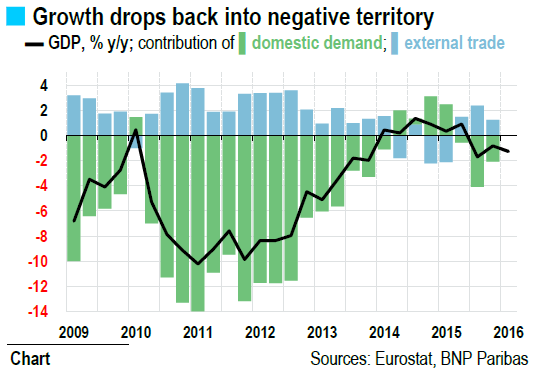- Negotiations over the programme’s first review could beconcluded soon, providing political relief both to the Greeks and the Europeans.
- Very ambitious fiscal targets were left unchanged, anddiscussions have begun on restructuring debt servicing costs. It is still uncertain whether the IMF will participate fully in the programme.
Even as Eurostat released its preliminary growth estimates showing that Greek GDP contracted 0.4% quarter-on-quarter in Q1 2016, i.e. a year-on-year decline of 1.3%, some notable headway has been made in recent weeks in discussions to conclude the first review of the European Stability Mechanism (ESM) financing programme. It now seems very likely that an agreement will be reached soon, maybe even by the Eurogroup’s next meeting on 24 May.
An agreement would enable European creditors to temporarily close the Greek question prior to the UK referendum, without risking in early July a liquidity crisis similar to the one experienced last year. In addition, a political victory would also enable the Tspiras government to consolidate its parliamentary majority somewhat. What remains to be seen is the basis that will be used to forge this compromise, and what consequences it will have on the economy and the sustainability of Greek public finances. Not long ago, there were strong divergences, not only between Athens and its creditors, but also between the Europeans and the International Monetary Fund1.
Fiscal targets: choosing austerity
The first point of disagreement concerned the size of savings to be generated by the package of measures elaborated last summer (EUR 5.4 bn, 3% of GDP), which the Greek government finally passed in early May. In the end, the Europeans played deaf and no changes were made to the medium-term target forced on the Greek government of a primary budget surplus of 3.5% of GDP by 2018. If this target is not met, as the IMF fears – it esteems that a target of 1.5% would be more credible and reasonable – a mechanism that will be approved soon would allow for the automatic implementation of additional fiscal savings measures. A year at most after the mechanism is triggered, the temporary automatic measures would have to be replaced by structural reforms validated by the creditors, which would strengthen the budget surplus in a sustainable manner. At most, these contingent measures would amount to EUR 3.6 bn, i.e. 2% of Greek GDP.
Debt: negotiations are underway
The Europeans, under IMF pressure, finally agreed to start negotiations on restructuring debt servicing costs before the conclusion of the first programme review. At this phase, the Eurogroup members are being very cautious: without admitting that restructuring is necessary to restore the sustainability of Greek public finances, they esteem that it will help the country regain access to the financial markets and smooth the debt repayment profile it will face at the end of the present programme. Yet the Eurogroup also wants to maintain incentives for the country to pursue adjustments after the programme ends.

To date, the Eurogroup has thus started negotiations based on a 3-phased process: 1) in the short term, technical measures will be explored to facilitate debt management, 2) in the medium term, if necessary and depending on the successful completion of the adjustment programme, the Europeans could agree to extend maturities and grace periods, and 3) in the long term, i.e. once the current programme is completed in August 2018, creditors have pledged to consider additional efforts, if they are still deemed necessary, once budget surplus targets have been met2.
How will the IMF participate in the programme?
At this point, we are still far from any major restructuring efforts that would clear the horizon concerning Greek public finances and foster greater confidence, so vitally needed to revive investments, restore growth and ensure the success of the privatisation programme. According to the press, the IMF has asked the Europeans to push back all interest and principal repayment dates on these loans until after 2040. The negotiations have only just begun. If they were to fail, the IMF might refuse to participate in the programme as a creditor, preferring instead to play the role of institutional “technical advisor”. The Europeans are also exerting strong pressure, and things have not gotten to that point yet.
by Frédérique CERISIER
